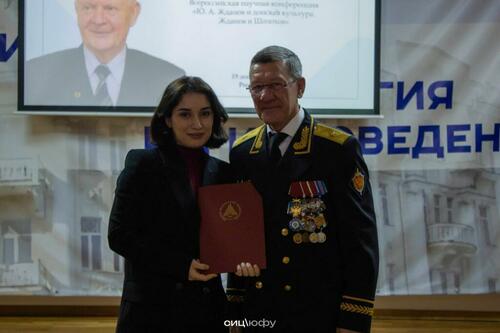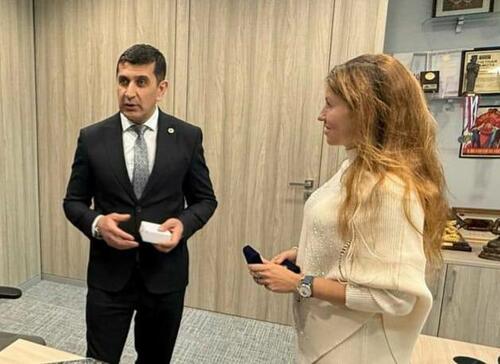In early February 2015 the Georgian media sources published that in one of the Georgian jails a group of prisoners had gone on hunger strike. By hot line channels in response to the request of the South Ossetian side, the Office of the Plenipotentiary Presidential Envoy of South Ossetia for post-conflict settlement has been reported by the EU Monitoring Mission in Georgia, that the hunger strike of prisoners is a true information, and along with the other prisoners in the Georgian prison in Gldani our fellow citizens - Kochiev, Valiev and Zaseev, sentenced to life imprisonment on trumped-up charges, are also participating in the hunger strike. It has also been reported that the hunger strike involves all the inmates sentenced to life imprisonment and long terms of imprisonment. The Office of the Plenipotentiary Presidential Envoy of the RSO for post-conflict settlement on all the international platforms, such as the Geneva international discussions on security in the South Caucasus and meetings in the format of Mechanisms to prevent and respond to incidents (MPRI), in accordance with the instructions of the President of the Republic of South Ossetia, his constant attention to the fate of the citizens of South Ossetia, being kept in Georgian prisons, has been consistently and persistently demanding the unconditional release of all the citizens of South Ossetia from Georgia's prisons, who are actually hostages of the Georgian law enforcement agencies. However, the reality is that the Georgian side remains deaf to the position of South Ossetia, and the Office of the Plenipotentiary Presidential Envoy of South Ossetia for post-conflict settlement does not have any other mechanisms to influence on the position of Georgia, except for the statements and verbal exhortations. Unfortunately, in our society, the issues related to the fate of South Ossetian citizens kept in Georgia prisons, caused the tendency to use this situation for impure political speculations. It is expressed in the form of attempts to present the situation in the biased online materials as if the respective authorized officials of South Ossetian do not pay any attention to the issues related to the fate of South Ossetian citizens kept in Georgia prisons. A similar tone, and sometimes the lack of detailed information about the activities of the Office of the Plenipotentiary Presidential Envoy may create a false picture of what is happening. In order to avoid such talks, the Office of the Plenipotentiary Presidential Envoy of the RSO for post-conflict settlement has to remind that thanks to the agreements reached by the South Ossetian delegation in the format of MPRI, since the end of 2012, the relatives of the South Ossetian citizens kept in Georgia prisons, are able to visit them monthly, while in the previous period they could not visit them more often than once every six months; they can monthly transmit parcels of personal belongings and food products not exceeding the total amount of 40 kg, while the previously transmitted things reached them so that the prisoners received summer clothes in winter, and vice versa, the transfer of food was not permitted; relatives have an opportunity to replenish personal accounts of prisoners, whereas previously it was not possible; Finally, the South Ossetian citizens in Georgia prisons can make phone calls to South Ossetia, and previously they were not allowed to do it. The parties agreed to implement these agreements through the Mission of the International Red Cross in South Ossetia, the ICRC's activities in this regard is based on the agreements reached by the South Ossetian delegation in the format of MPRI.
It would be appropriate to remind that the total number of citizens in Georgian prisons, natives of South Ossetia, by mid-2012 was 25. At the moment, the number is five; the others were released during the past 2.5 years. In our society, sometimes are expressed opinions that the violators of the state border of South Ossetia (which are usually the residents of the Georgian villages adjacent to South Ossetia), should be exchanged for the South Ossetian citizens kept in Georgian prisons. In this case, it is appropriate to note that the Republic of South Ossetia cannot apply to this category of citizens of Georgia any other criminal law, except those applicable to the facts of illegal crossing of the state border and the surrounding circumstances. It should also be emphasized that the Office of the Plenipotentiary Presidential Envoy of the RSO for post-conflict settlement does not make any decisions about the release from the South Ossetian investigating authorities or any "exchanges" because it has no authority to resolve such cases.
It would also be appropriate to inform the interested public about the position of the Georgian representatives of numerous proposals on mutual release of prisoners, as expressed by one of the leaders of the Georgian delegation in the format of MPRI, who stated that "the shepherds are not exchanged for criminals."
In the final part of the message we once again want to remind that the Office of the Plenipotentiary Presidential Envoy of South Ossetia for post-conflict settlement, unfortunately, does not have other mechanisms to impact on Georgia, except for diplomatic efforts.






